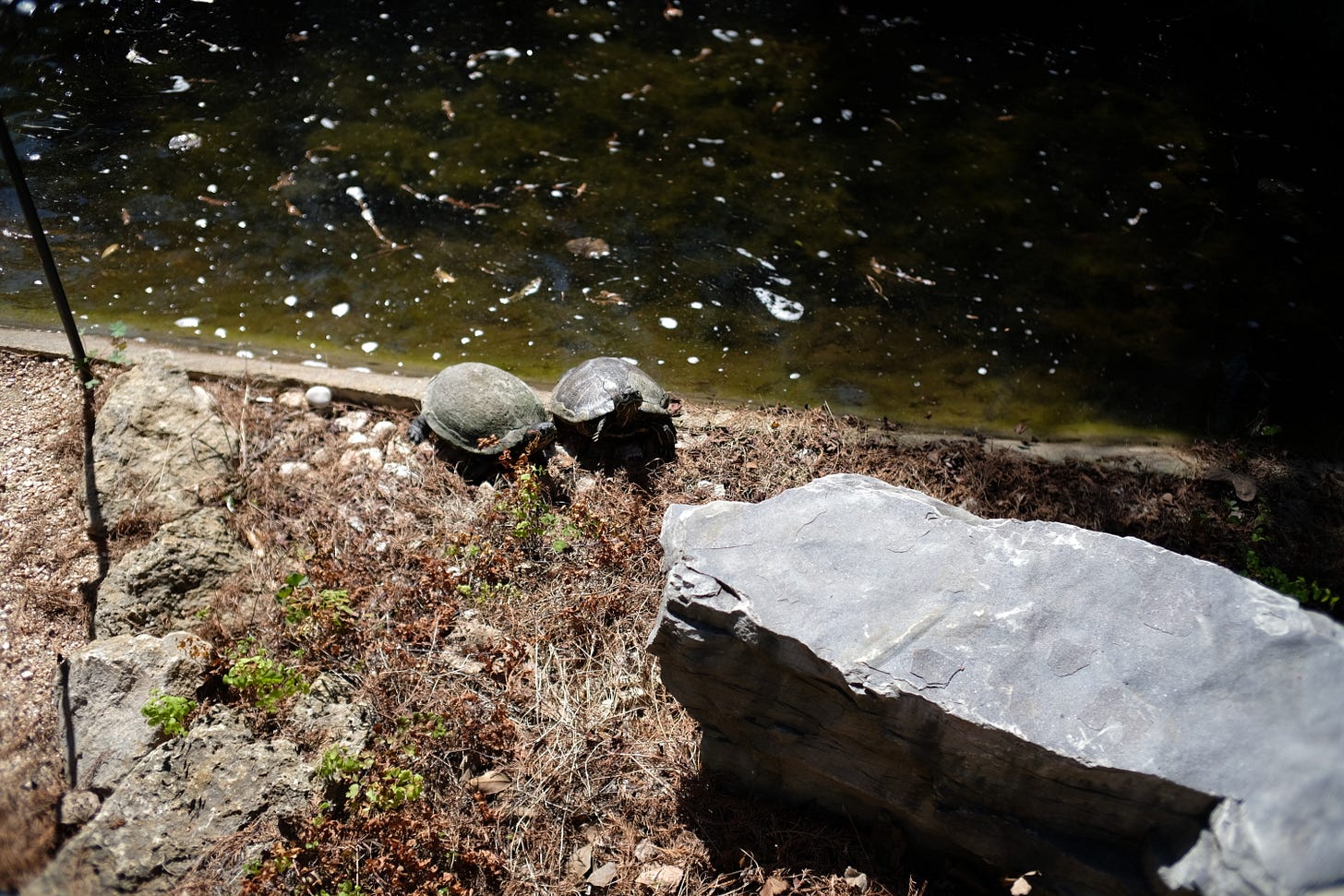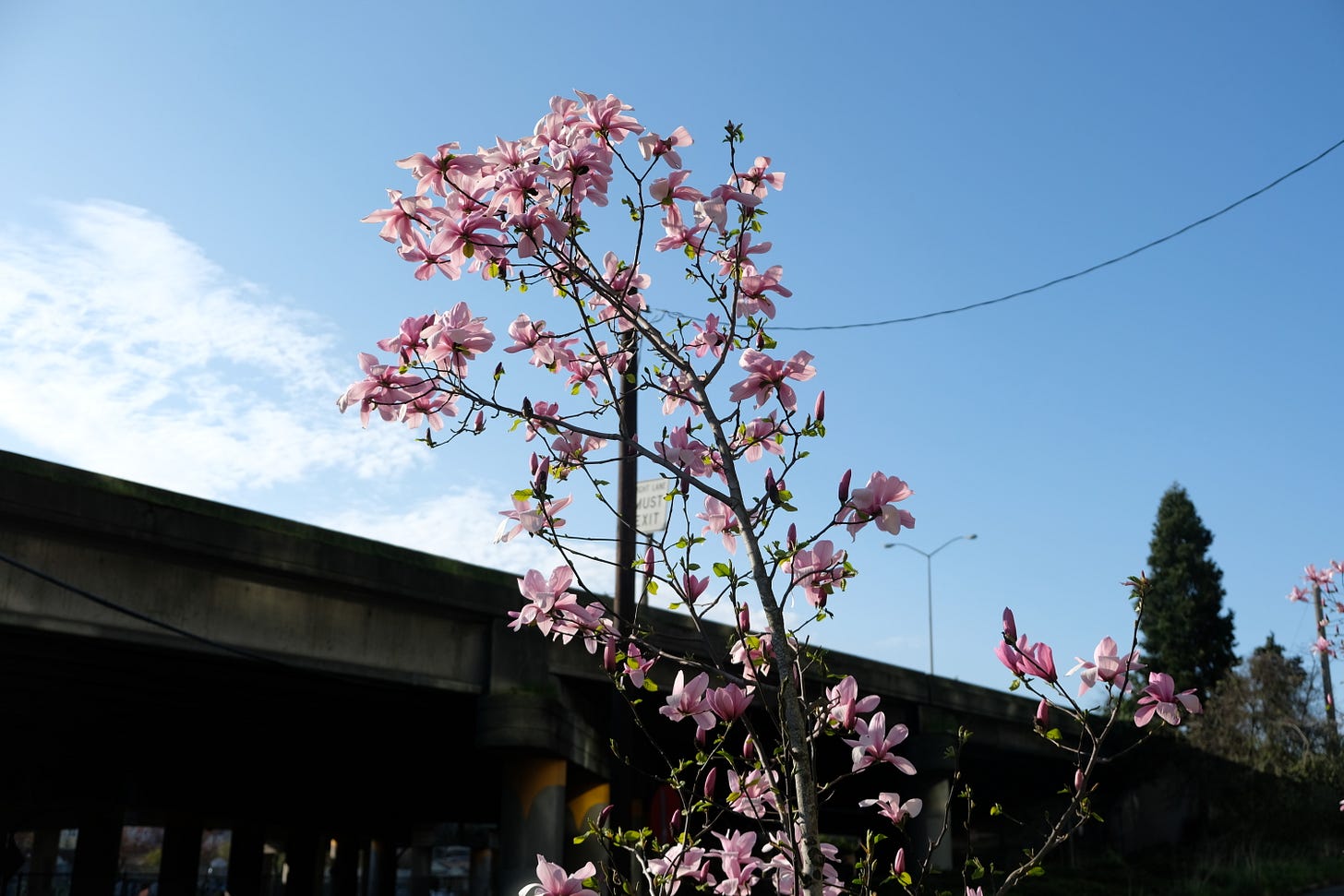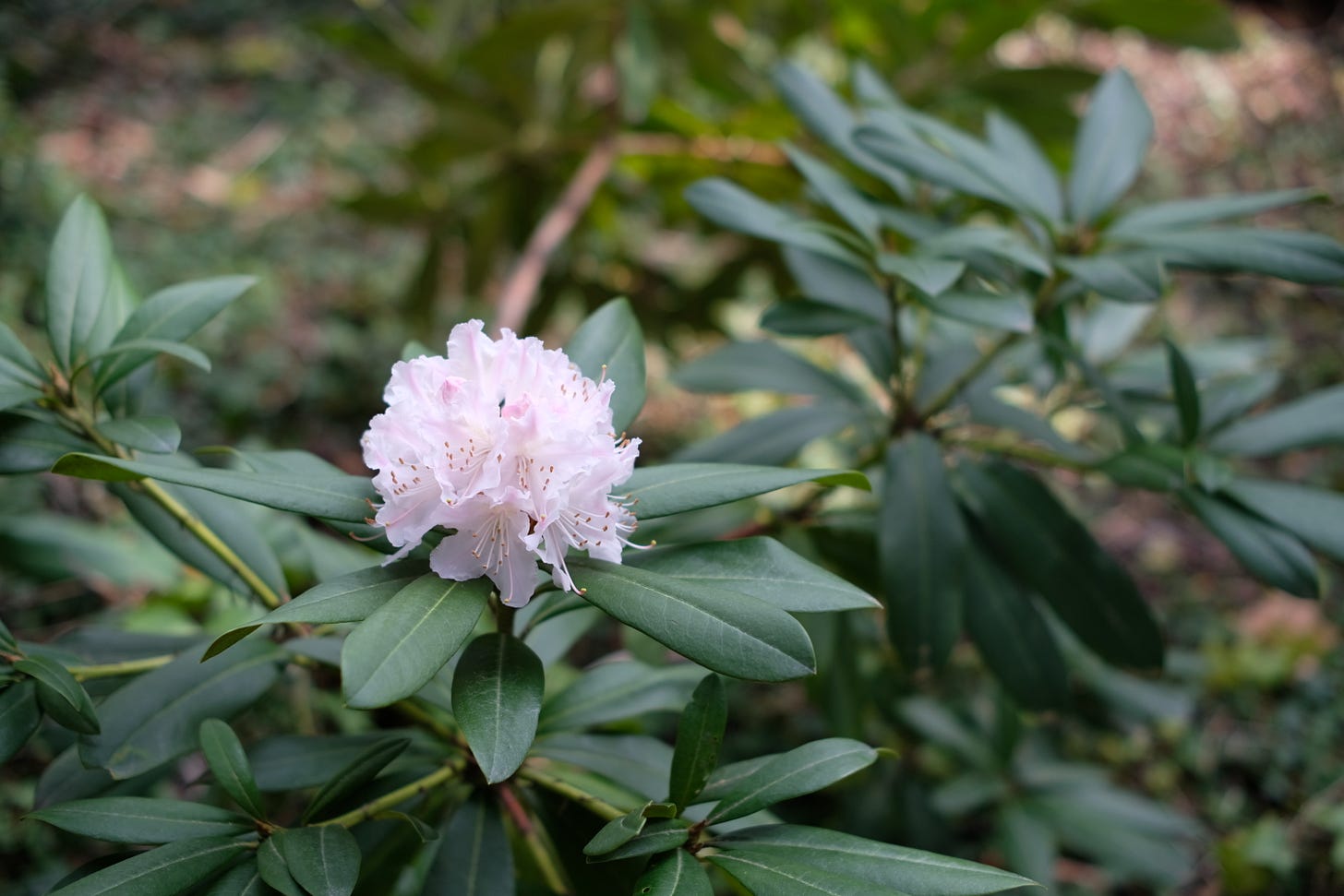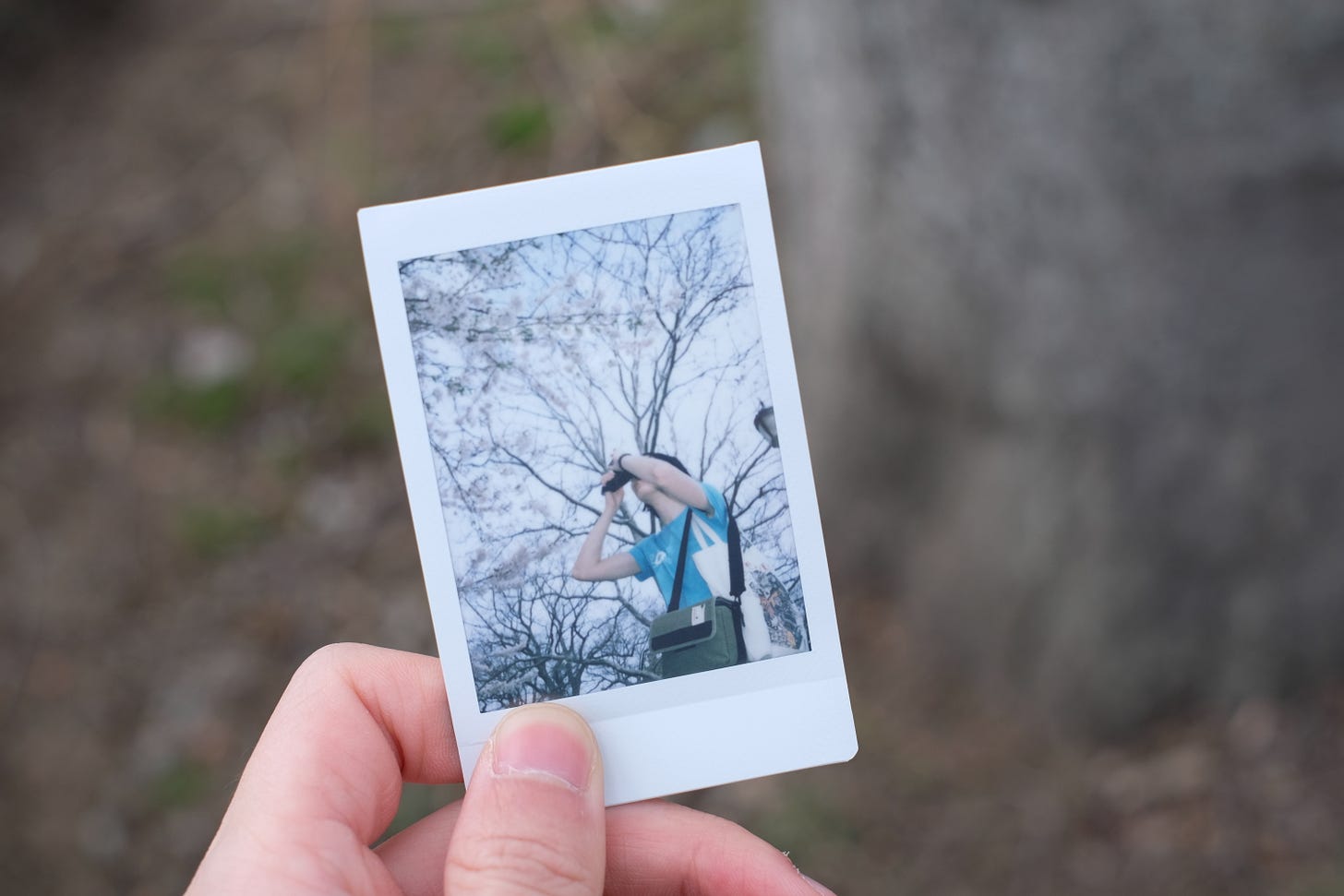ed. note: this post is “too long for email.” good luck!
I turned 23 this week! It’s strange how upsetting the number 23 is to me; you would think that, after years of schooling and whatnot, one might eventually grow out of the “this number is good and that number is bad” mentality, but the primality of 23 upsets me, as does, of course, the fact that it is another step towards true adulthood with no upsides whatsoever (looking at you, rental car surcharges). Still, another year goes by, and I’m happy to be alive and well after all this time. Wahoo!
1. busy march
I had a March which I have started to refer to as “busy March,” which is not the most eloquent name, but it is accurate. I had zero free weekends in March; I started the month off with a trip to Austin to see a friend, and then there was the Instant Noodles play festival, and then two weekends of choir concerts and a week of substitute music directing for a youth theatre production of Seussical.1 There was also some pretty significant work pressure; I had two big features I needed to land before a deadline, and both were cross-cutting changes (as our work often is, in the kernel) that required a lot of thought. There was not a lot of rest to be found, or, in other words, it was a busy month.
In fall 2023, when I was singing with the MIT Chamber Chorus, we sang a piece by Caroline Shaw called “and the swallow,”2 which is a setting of Psalm 84. It’s a beautiful piece throughout, but the thing that sticks with me is this passage where the high voices navigate these really tricky turns, this strange haunting melody which ascends and descends with lots of harmonic richness, until suddenly, everything resolves. Then, the text which takes us through the rest of the piece is:
They pass through the valley of Bakka,
they make it a place of springs;
the autumn rain also covers it with pools.
As best I understand, the valley of Bakka is commonly understood as a place it is difficult to pass through; a place on a pilgrim’s journey which may be dangerous, or desolate, or lonely. In some translations, it has been rendered directly as the “valley of weeping.” And, in a sense, this is how the piece goes too: after the passage through this difficult, haunting upper-voice section of the piece, we emerge into this new place, this harmonic resonance where everything is calm, where the long-sustained notes are smooth like the surface of a pool, speckled with raindrops falling in some of the other voices, which are notated with the sound na’n’n’.
I think about this piece often, when I am going through some new and difficult time. I think about it in the “this too shall pass” way, knowing that I will pass through this valley of Bakka; that, in some sense, difficulties are finite, exhaustible. But I also think about how “they make it a place of springs”: it is not the tortured artist’s stereotype of creating art from suffering, but rather that by passing through this difficult place, we are alleviating its difficulty; we will make the harsh world of our reality a place of springs. There is something so hopeful to me about that idea: that we will live through difficulties that the people after us will never experience; we will make the world a better place.
This March was one of these new and difficult times. I was busy in a way that felt deeply unfamiliar to me. Of course, I’ve been busy before, but the activity of this March felt more abstract; towards a purpose that was less tangible. It’s a very strange feeling, because I’m writing code that will be used by vastly more people than will ever see or read anything I write, but all this impact is felt in a way that is so removed from my present or from a sense of human connection. At school, being busy also meant that I was learning a lot, in a way that is not quite as true now, and, since my hobbies are now no longer part of the institution I work at (as clubs are at MIT), they also feel different, less important or valuable. So, I was busy, but the busyness didn’t feel the same.
It’s a strange feeling, and I’m not yet sure how to feel about it. I don’t want to reject it out of hand just because it’s something new: one of the fundamental truths about life is that things change, and you have to adapt. I also think this intangibility is somewhat my own fault: practically speaking, I have made exactly zero effort to make new friends since I moved here, so it’s maybe unsurprising that I don’t feel connected. It’s not surprising that I don’t have any tangible output from this month because I haven’t put in the time to write anything serious since moving to Seattle. Still, I’m thinking about it—about whether I need to get used to the abstractness, and about how (or where) to bring back some of the things I’m missing in this new mode.
2. also busy april.
Looking at my notes, it turns out April was also pretty busy, although not quite to the same level of overwhelming. There was my first orchestra concert in almost six years with the Redmond Technology Orchestra.3 The weekend after that, I had a one-day choir retreat after which I got on a plane to Boston, where I stayed for eight days. My choir had its annual charity auction the following weekend.4 Lots to do.
I’d visited Boston a few times already before this trip; I went in October and November just to hang out, and then in January to go to Mystery Hunt. Still, this trip felt very different, somehow. Maybe it was just longer, or maybe it had been longer between visits, but I kept being surprised with new and different feelings that I hadn’t felt in the previous trips.
One of these surprising feelings was the delight I had in just not being recognized anymore on campus. It’s not that I was a particularly popular person while I was at MIT, but I knew a lot of people from so many different contexts: the acapella people, the theatre people, the student government people, the students I was TAing for, everybody in Next House, etc.. I think I had placed a lot of pressure on myself to be able to quickly respond to people in each of these contexts, the sort of micro-code-switching5 that happens when you need to talk and appear to certain people as a TA, certain people as a musical director, and certain people just as yourself. Having that burden fall away and just being able to sort of be normal and anonymous in the hallways felt nice.6
I was also reminded that I used to be a person that did things, things that were good for other people, things that made them believe in me. I talked to many people who brought up things I’d done unprompted, whether it was shows I’d written, things they wouldn’t have done without me, or just flat-out that they looked up to me. And it was strange, because I still don’t know what they are looking up to. In a journal entry from the trip, I wrote:
I don't know. I don't think I know what it means to be a good person. I have only ever been good in contexts where I have been able to just exist in community with people, to just be myself, helping people out, encouraging them to do things they haven't done before.
It was strange to talk to all these people again, friends and underclassmen and professors, and have them all be so full of belief in me. It reminds me that it really is not that hard to make someone else’s life better, given that most of what I did in college was show up (often) and be kind (occasionally) and competent (when possible). I was afraid that I would show up on campus and people would mostly go, “why are you around?”, because—frankly—my showing up on campus, was extremely self-indulgent;7 afraid that people might see me (and perhaps accurately) as another annoying cruft who can’t let go of what MIT was to them. And, well, there was very little of that, even as I hung around Next Act and provided unsolicited opinions and so forth; mostly it was just spending time with friends and acquaintances, having conversations with people I hadn’t talked to in a while, and lots of joy.
Maybe this is just selection bias; that, obviously, the people who I haven’t helped or who dislike me just don’t talk to me. I still think there’s something to be said here, about the fact that there used to be ample opportunity to be helpful and a direct positive influence on people’s lives, and that opportunity has waned outside of college, or, rather, maybe I just haven’t found it yet.
3. you must change your life.
All of this is to say, I am thinking about how I should respond into these feelings. Travelling back from Boston to Seattle, I really did have this overwhelming feeling of: I used to be better. I used to do good things for people, directly, and I need to do that again. I’m still not sure what that looks like, but I am actively looking for ways to do that both at work and outside of it; I am taking on different tasks in my orchestra and signing up to meet with interns and generally trying to try new things, and we will see what sticks.
On the colder, more calculating side of the scale, I do really want to make something of this year. Measuring life by very specific milestones is a fool’s errand, but I am also a fool who is drawn to measurability, to the idea that I ought to try to sustain some level of performance, to achieve things over time. In the past few years, I’ve been lucky enough to write something Big and Public each year; a play at 19, a play and an SB thesis at 20, a play at 21, and, just last year, an MEng thesis at 22.8 Now, I’m 23, and I’ll need something to show for it, when the year comes back around in another twelve months.
I don’t know. I need to be cautious here, because these thoughts begin to resemble the kind of blind ambition that I’ve never liked, the desire to change the world without an actual theory of change. Wanting to make things is not quite that, because, at the very least, I have some understanding of how the things I make can change people’s lives, or, at the very least, how being open and involved in a creative process has helped people in the community around me become more open and involved as well. But the desire to make something reeks of ambition. In the ever-relevant words of Agnes DeMille:
I confessed that I had a burning desire to be excellent, but no faith that I could be.
I’ve never thought of myself as particularly ambitious, but I’m starting to realize that I kind of am. I’ve always been pretty competitive, but for a long time I thought that was related to some kind of model minority complex I had growing up, where I mostly wanted to be the best so other people couldn’t judge me for being Asian.9 As I’ve passed through MIT into the real world now, though, that feeling hasn’t faded: I am still full of this desire to be excellent, or, perhaps, unimpeachable. I’m not sure whether to lean into the ambition or to back off of it, as something that might never satisfy me; to kill the part of me that is cringe, or the part of me that cringes. I guess there’s enough time in a life to try both, and, all the above considered, it might be time to lean into it a little bit, before leaning away.
4. things I love.
I’ve been meaning to write about some things I love, and all of them tie into something I’m writing about this in this post, so I am just going to put them here.
For a long time, I have been thinking about “life-changing experiences,” moments that radically reshape how I think or how I feel. In Rainer Maria’s Rilke “Archaic Torso of Apollo,” he describes the titular sculpture’s effect, concluding:
…for here there is no place
that does not see you. You must change your life.
A surprising thing for me is how often the experiences which have given me this feeling, this world-spinning, gut-punching, life-changing feeling, have been food. I think about having my first shrimp tempura and miso soup at Umai, on Newbury Street with Tong during our particularly turbulent fall of 2021; I think about the oysters at Cochon in New Orleans, which Krit and I stumbled into tired and underdressed after just having gotten off a 24-hour train ride from El Paso. Outside of food, I think about wandering into Dan Flavin’s “The Diagonal of May 25, 1963” at the Met in my first visit to New York during my freshman year; or of hearing Rachmaninoff’s “Rhapsody on a Theme of Paganini” for the first time at the BSO together with Jeffery, and the way the music’s magic seemed to trail with us out into the Boston winter.
My three recommendations for you this time, things that have been life-changing, at least for me, are 1) a musical, 2) a very specific genre of choral music, and 3) a restaurant.
the musical
I saw the musical Maybe Happy Ending on Broadway in December last year. I don’t want to say too much about it, because I really do think if there’s any chance you can be in New York City at any point in the next N months while it’s still running, you absolutely should go and see it. Very reductively, it’s a show about robots who fall in love, but it is simultaneously so joyful and heartbreaking and indescribable. At some point, the New York Times review for this show literally gives up and says:
But no more of the plot. It’s too subtle for summary anyway, and worth coming to cold.
This is probably my favorite show I’ve ever seen live,10 and up there in my list of favorite musicals of all time; it’s so delicately and beautifully constructed from the music and lyrics up to the actors and to all of the tech involved. The cast recording is out, but if you can see the show live, save it for afterwards. You’ll want something to remember the experience by.
the very specific genre of choral music
Our most recent choir concert was called “Containing Multitudes,” and it consisted almost entirely of choral settings of Walt Whitman’s poetry. There was a lot of music for this concert, and with performances spread over two weekends, I ended being somewhat stressed about the whole thing, which meant that I spent less energy paying enough attention to how much I liked the music.
It turns out I actually liked the music a lot. Now, almost two months on, I’m still singing different pieces to myself and reflecting on the texts, which feel incredibly apt for the time and circumstances we find ourselves in—a combination of the immense foresight or timelessness (depending on your point of view) of Whitman, and the keen sense of our choir director.
Three pieces stand out for me—Eric Whitacre’s “All Seems Beautiful”; text from Song of the Open Road, 5:
From this hour I ordain myself loos’d of imaginary lines
Going where I list, my own master total and absolute.
Listening to others, considering well what they say,
Pausing, searching, receiving, contemplating,
gently, but with undeniable will, divesting myself from the holds that would hold me.
I inhale great draughts of space.
The East and the West are mine, and the North and the South are mine.I am larger, better than I thought,
I did not know I held so much goodness.All seems beautiful to me,
I can repeat over and over to men and women
You have done such good to me, I would do the same to you,
I will recruit for myself and you as I go,
I will scatter myself among men and women as I go,
I will toss a new gladness and roughness among them,
Whoever denies me it shall not trouble me,
Whoever accepts me he or she shall be blessed and shall bless me.
Stacy Garrop, “A Blade of Grass / I bequeath myself” from Terra Nostra; text from Song of Myself, 52:
I bequeath myself to the dirt to grow from the grass I love,
If you want me again look for me under your boot-soles.You will hardly know who I am or what I mean,
But I shall be good health to you nevertheless,
And filter and fibre your blood.Failing to fetch me at first keep encouraged,
Missing me one place search another,
I stop somewhere waiting for you.
and Riley Brule’s “Great Are The Myths,” which was commissioned for the chorus specifically for this concert, and which you cannot hear anywhere else presently; text from Leaves of Grass (1855):
Great are the myths …. I too delight in them,
[…]Great is today, and beautiful,
It is good to live in this age …. there never was any better.Great are the plunges and throes and triumphs and falls of democracy,
Great the reformers with their lapses and screams,
Great the daring adventure of sailors on new explorations.[…]
We are just as good and bad as the oldest and youngest or any,
What the best and worst did we could do,
What they felt .. do not we feel it in ourselves?
What they wished .. do we not wish the same?Great is youth, and equally great is old age …. great are the day and night;
Great is wealth and great is poverty …. great is expression and great is silence.
I don’t think I can add anything to what Whitman has already said, except to note how relevant and important this universalness of humanity still is. I hope that we one day “ordain [ourselves] loos’d of imaginary lines.”
the restaurant
The thing about life-changing experiences is that, often, once your life has been changed, the life-changing experience ceases to be notable. You only taste a certain flavor for the first time once, only hear a certain piece or read a certain poem or see a certain painting for the first time once. Once your perspective has been shifted, it becomes impossible to unsee what you were missing.
What is incredible, therefore, about Cafe Mami, is that almost every meal I’ve had there has been life-changing. I don’t know what about it is so special to me. I’ve ordered the same thing almost every time, but each time, it feels so much like home or so comfortable or maybe just tastes so damn good that I am always rejuvenated, filled with some new hope or delight. It reminds me that the world is beautiful and full of hope. This is the only food that has ever been close to moving me to tears.
I should give some context. Cafe Mami is a Japanese restaurant in the Lesley University food court, up in Porter Square in Cambridge, MA. It’s a small place; the main seating area only has three tables and a countertop, although it’s expanded a bit now to the space next door. Every time I go, I get the pork cutlet curry, which also comes with a miso soup and a salad, the latter of which is the only good salad I’ve ever had. I have been almost fifty times, which is especially impressive given that it is thirty minutes to an hour of travel from the dorms via the pre-Phil-Eng Red Line. I have considered delaying my flights out of Boston in order to eat there. It is worth much to me.
I do not know what is so good about the pork cutlet curry. I do not know if other people have similarly superlative opinions of it, but it does not matter to me, because I love it so, so much. Maybe it reminds me of my oft-mentioned first time I felt at home at MIT, making Japanese curry with strangers on Putz, or maybe it is just seasoned very well to my liking. Whatever it is, it is delightful, and I recommend it wholeheartedly.
5. post-scripts
What’s next? The summer’s coming soon, and fast, and the light-strewn days of Seattle are bringing with them a kind of joy I had forgotten, when the sun sets after 9 PM and so everything is beautiful outside, even after a long day of work. I’m taking a bit of a vacation to go attend my MEng Commencement,11 stopping in New York City along the way to see Maybe Happy Ending again with Paolo. There are many festivities planned for commencement week; I’m hoping, as ever, to visit my favorite New England town of Rockport; to watch and play through the score of Mamma Mia with the 4W friends; and to try some new traditions too, such as a cross-Boston hide-and-seek of some variety. A little further out, many people are coming to visit Seattle, which ought to be fun as well; more updates there as they occur.
On a completely unrelated note, I updated my book collection catalog recently, and it turns out that over the course of the last five-ish years, I have amassed 140 books, with a particularly good plays (19) and poetry (36) collection. If you or a loved one are interested in borrowing a book or perusing the catalog, please let me know. One does not have to live in Seattle to apply; lending terms for remote folks last from “when I see you next” to “when I see you after that,” and I’m always looking for new places to visit!
Wow, what an experience. I had no experience teaching middle schoolers, and I also had no experience with Seussical, so this was a real learning curve, but I knew it was something I wanted to try, almost because it was so far outside of my comfort zone. Frankly, I am not sure exactly what I learned from doing it, but I do know I learned a lot, and I am heartened 1) to have my first music direction credit of any kind in the Real World™ and 2) by the kid who told me “good job with the piano" as I left on the last day 🥹.
This is the first recording I can find on YouTube. Our performance of it is less well-engineered, given that it was recorded live in Kresge Chapel, but can be found here, around the 31-minute mark. I would recommend the rest of this concert, generally; like I said, it’s one of my favorites.
This is an open (i.e., no-audition) orchestra that is primarily composed of Microsoft employees and rehearses after work on the Microsoft campus. It had been 2152 days since my previous symphony concert, which is truly an astounding period of time, but it’s really good to be back, and with some delightful pieces too (particularly Rachmaninoff’s Rhapsody on a Theme of Paganini and Piano Concerto No. 2).
I got in a bidding war with my tablemate over a basket of fourteen books during the silent auction, which was good fun. Naturally, I won, although mostly by submitting my final bid mere seconds before the fixed time cutoff.
Not to be confused with microcode switching.
This feeds somewhat into my ongoing theory of backstage work. I really like doing behind-the-scenes work, work that serves as the backbone for a project (the script, the music, etc.) but does not require me to be recognized in any way. The more I think about this, the more it seems like some kind of guarded pathology; I want the work to be judged but none of the recognition, so that I do not actually have to submit to the “mortifying ordeal of being known.” It turns out you will be known either way.
In particular, my putative reason for showing up to campus for this week was that, in 2023, I had promised the saxophonist in Heathers that I’d play for him if he ever conducted a show with a violin part; with him conducting this year’s Next Act, this was (finally) the fulfillment of that promise. Mostly, I got to show up and just have fun in the pit again, with no pressure to do anything else, no strike, no vocal problem-solving, no nothing.
Yes, I know, this is a completely stupid and unhinged way of thinking about accomplishments, and, no, I will not stop.
Two points: 1) this was not a coherent thought and 2) no, it did not work (although I think it maybe did help).
No. 1 out of 83 or so, though, to be fair, only four of those shows have been Broadway productions.
MIT only has one Commencement a year, and so, since I graduated my MEng in September, I get to walk this year, in May. Though, honestly, I’m mostly going to see my undergraduate friends walk, and also to watch Hank Green give the speech at OneMIT, which I am genuinely very excited about.









ed. note: this post is “too long for email.” good luck! » wow is substack that weak
all this impact is felt in a way that is so removed from my present or from a sense of human connection » i think the "human connection" matters to me less than the scattering/diffusion of the impact, but i can relate to this, yeah
afraid that people might see me (and perhaps accurately) as another annoying cruft who can’t let go of what MIT was to them » hahahahhaha same
particularly ambitious » "ambitious without ambition" is what i've heard
almost every meal I’ve had there has been life-changing » tampopo, which is almost next door, almost plays that role for me, i think
see Maybe Happy Ending again » man i kinda wanna watch it again too